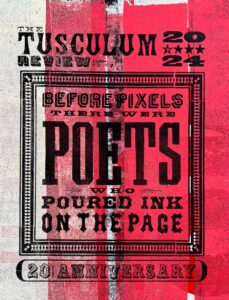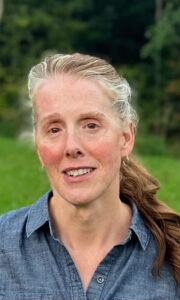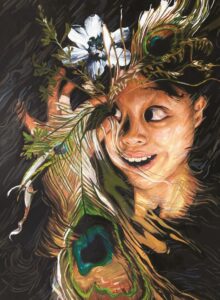GREENEVILLE – Now enjoying its 20th anniversary, Tusculum University’s international literary journal is back with a new edition that presents more high-quality work from globally acclaimed authors who have collaborated with Tusculum students to produce another can’t-miss read.

This is the cover for the newest edition of The Tusculum Review.
Meanwhile, editors of that journal, The Tusculum Review, are also introducing its prize-winning nonfiction chapbook for this year, “The Nature of Alaska: An Introduction to Familiar Plants, Animals and Outstanding Natural Attractions,” written by Mirela Musić.
Community members are invited Wednesday, Nov. 20, at 7 p.m. to Behan Arena Theatre, where Musić will read excerpts from the chapbook, answer questions facilitated by Tusculum students Zach Mitchell and Zoey Seay, sign copies and participate in a reception. The event will also celebrate the upcoming launch of The Tusculum Review’s 20th volume and provide attendees with the opportunity to preorder copies. Kevin Bradley, an artist and letterpress printer who designed the journal’s cover, will attend and sell prints of that cover as well as his other artwork.
“This moment is the culmination of 20 years of work by dedicated students and editors,” said Kelsey Trom, The Tusculum Review’s editor and an associate professor of English at the university. “We’re thrilled to share this issue, filled with vital work by distinguished and emerging writers, with the community. We take great pride in evaluating and selecting a wide range of thoughtful, well-crafted writing for every volume.
“This issue is thicker than usual, so there’s something here for every reader: war, motherhood, manhood, self-portraits, fertility, the natural world, historical fiction, testosterone, aging, connection. The work we do with our ambitious, meticulous and alert student editors honors our tradition of excellence in creative writing at Tusculum. We’re certain community members will enjoy spending time with our visiting writer and artist at this anniversary event, hosted by our capable students.”

Mirela Musić
Musić is a writer and director based in Brooklyn. After receiving her Master of Fine Arts in creative nonfiction from the University of Montana, she continues to work on the intersection of identity and place through film and essay. “Pony Girl,” her first professional short film, is in post-production.
Dr. Josh Martin, assistant professor of English, said Musić wrestles with themes of survival and acceptance in “The Nature of Alaska.” The chapbook begins on a salmon fishing boat in Alaska, and she navigates as a woman an ultra-masculine – and often toxic – environment. She reflects on bad behavior her father exhibited, and at the same time, she works for a salmon transportation captain who acts nice at first but then shows a nefarious side.
Mary Cappello, who Trom calls the matriarch of creative nonfiction, served as the judge for all 100 chapbook entries and chose Musić. As the winner, Musić received $1,000, and “The Nature of Alaska” will also be published in The Tusculum Review.
“Aesthetically speaking, ‘The Nature of Alaska’ shows an extraordinary command of movement across place and time,” Cappello said of the entry. “The sinuous possibilities of sentences, the profoundly sensory ‘rightness’ and originality of words well-chosen, of phrases that resound, and of paragraphs, whose riffs, lyrical tempos, and subtle juxtapositions animate an understanding of the forces that roil beneath our daily lives but that often go unnamed.
“This is an essay about the precariousness of sleep, the indefinable nature of home and the power of place to hold us or eject us. It’s about finding family or fleeing family. It’s a wrangling with the terms by which we accept our own oppression. The first time I read this writing, I was rapt and deeply moved. The second time, caught in the undertow of its final sentence, I wept. Have I read this writer before? I don’t think so. I can’t wait to read more.”
The chapbook contains illustrations by Ayla Bramblett that Trom calls “psychologically astute.” Bramblett is an undergraduate student at Virginia Commonwealth University who is studying communication arts. In addition to her work in the chapbook, Tusculum will feature her self-portraits in The Tusculum Review.

Dr. Josh Martin

Kelsey Trom
This volume of The Tusculum Review will contain 28 authors across the globe, including New Zealand, the Netherlands and Manitoba, Canada outside the United States and Atlanta, Pittsburgh, Chicago and the coast of Washington in the country. A team of editors for The Tusculum Review combed through about 1,200 entrees, meaning the acceptance rate was 2.3%.
“It is really competitive to appear in our journal,” Dr. Martin said.
In examining this newest edition, Dr. Martin said highlights include the nostalgia associated with this being the 20th anniversary of The Tusculum Review. He said the journal’s contents properly honor that legacy, calling the selected poems top-notch and the nonfiction outstanding. Trom said The Tusculum Review includes more nonfiction this year than ever before, an intentional move because the chapbook features a nonfiction essay. There were also a lot of nonfiction submissions for The Tusculum Review.
The Tusculum Review publishes work in four genres – drama, fiction, nonfiction and poetry.
Dr. Martin said the newest edition touches on reclaiming the writing space from artificial intelligence and literature as a means to connect and unify people. In addition, the journal will publish the sequel to Karen Fisher’s prize-winning 2005 historical fiction novel, “A Sudden Country.” The work includes the voices of a surveyor and Civil War veteran and an indigenous woman.
One of the journal’s strengths this year is it cannot be pigeon-holed into one category, Trom and Dr. Martin said. Subjects include being gender nonbinary as well as poems from working-class writers that speak about the working class and poets exploring form in different ways. The Tusculum Review also has a play, which is not common in literary journals.
“This edition speaks to everything that is on people’s minds,” Trom said. “It is of its moment. It’s representative of a wide variety of voices, which is super important.”
The editors for this year’s edition of The Tusculum Review are:
- Kelsey Trom – editor
- Josh Martin – poetry editor
- Desirae Matherly – nonfiction editor
- Wayne Thomas – drama editor
- Kelsey Trom – fiction editor
- Eli Berney – assistant fiction editor
- Zach Mitchell – assistant nonfiction editor
- Bob Schaff – assistant drama editor
- Zoey Seay – assistant poetry editor
The editors have extensive experience in their respective genres, and many of them have been affiliated with The Tusculum Review for years. Trom and Dr. Matherly have both served as the editor for multiple years and retained the tradition of excellence that has marked The Tusculum Review throughout its history.

“Inside” is a self-portrait from illustrator Ayla Bramblett folio in The Tusculum Review. She also completed illustrations for the chapbook.
Helping the authors and editors were a group of Tusculum students from many different majors whose performance enabled the journal to achieve its renowned quality. As is always the case, students read submissions, performed the layout of the ones being published and corresponded with the authors. Many of them served as assistant editors. But Trom gave them additional plaudits.
She said Mitchell, a senior, was critical in reading initial submissions for the chapbook prize and helping narrow the list of potential winners to 12, from which Cappello was able to choose the winner. He then interviewed Cappello about her selection.
Trom credited Seay with a lot of behind-the-scenes organizational work and Schaff and Eli Berney for assisting with production of the journal while performing lots of community service in the wake of Hurricane Helene. Maria Torres refined The Tusculum Review’s mission statement after multiple people associated with the publication contributed to its update. She and Seay collaborated on a marketing plan for The Tusculum Review.
Students in the Literary Editing class redesigned The Tusculum Review’s website, https://ttr.tusculum.edu/, which now features videos of authors who have visited campus and the launch of the 19th volume in 2023. Federico Belintende has led the students’ website design effort.
Other students who have contributed to The Tusculum Review’s success are Caleb Moody, who carefully updated the author index, and Kiersten Paxton, who ensured all of the authors and artists featured in every volume were visible on the website.
Attendance at the Nov. 20 event is free. The cost for a copy of the chapbook is $10 and is payable at the reception. To preorder a copy of The Tusculum Review, please visit https://ttr.tusculum.edu/gifts/ or visit the table at the reception of the Nov. 20 event. More information about the university is available at www.tusculum.edu, and further details about the English program can be accessed at https://site.tusculum.edu/english-2/.


